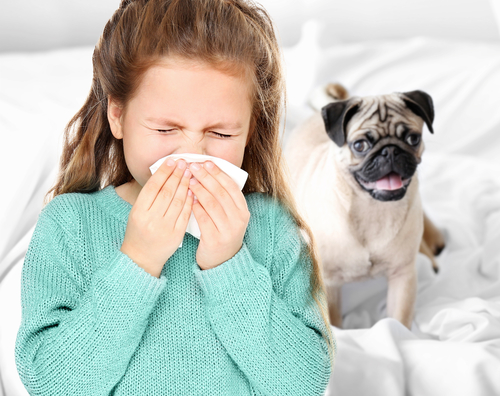It’s not as if dog lovers needed more reasons to appreciate their furry friends. But researchers have discovered in two separate studies that dogs can help protect children against asthma, even when a child has a dog allergy, and they can help protect against allergic eczema when babies are born in a home with a dog during pregnancy.
Findings were presented at the American College of Allergy, Asthma and Immunology (ACAAI) Annual Scientific Meeting, Oct. 26-30, in Boston, in a presentation titled “The Effect of Animal Exposures on Asthma Morbidity Independent of Allergen Among Inner-city Asthmatic Children.”
In the asthma study, researchers assessed the impact of two different types of exposure to dogs on children with asthma in the U.S. city of Baltimore. Researchers defined “exposure” to dogs as keeping at least one dog at home for a minimum of one hour a day.
One type of exposure was direct contact to the main cause of an allergy, a trigger protein called an allergen. The other type of exposure was to elements a dog might carry, such as bacteria.
The team found that the second type of exposure — to elements that dogs carry — might protect against asthma symptoms. In other words, the elements carried by dogs have a protective effect against asthma.
Contrary to this protective effect, direct exposure to the allergen may increase asthma symptoms in children with dog allergy in urban areas.
“Among urban children with asthma who were allergic to dogs, spending time with a dog might be associated with two different effects,” Po-Yang Tsou, MD, MPH, who presented the study, said in a press release. “There seems to be a protective effect on asthma of non-allergen dog-associated exposures, and a harmful effect of allergen exposure.”
The team believes that elements carried by dogs (not dog allergens) could be the influential factor that ultimately provides protection against asthma.
“However, dog allergen exposure remains a major concern for kids who are allergic to dogs,” Tsou said.
The ACAAI advises people who are allergic to dogs to decrease exposure and work with their allergist to avoid an increase of symptoms.
ACAAI provides a few tips for dog owners with family members who have a dog allergy:
- Restrict the dog to only a few rooms and avoid having it in bedrooms. Remember, allergens will spread throughout the household, not only in rooms the dog can access.
- After petting a dog, wash hands with soap and water.
- Allergen levels in a room might be reduced over time with high-efficiency particulate air (HEPA) cleaners running 24/7. Allergen levels can also be reduced by frequent vacuum cleaning with a high-efficiency appliance or a central vacuum.
- Airborne allergens can also be reduced by giving frequent baths to the dog, at least once a week.
Another study presented at ACAAI’s annual meeting showed that exposure to dogs during pregnancy has a protective effect against allergic eczema in babies. This protective effect is only evident until the age of 10.
“Although eczema is commonly found in infants, many people don’t know there is a progression from eczema to food allergies to nasal allergies and asthma,” said allergist Gagandeep Cheema, MD, lead author of the second study and an ACAAI member. “We wanted to know if there was a protective effect in having a dog that slowed down that progress.”
“We found a mother’s exposure to dogs before the birth of a child is significantly associated with lower risk of eczema by age 2 years, but this protective effect goes down at age 10,” said allergist Edward M. Zoratti, MD, an ACAAI member and study co-author.
Good dog!

